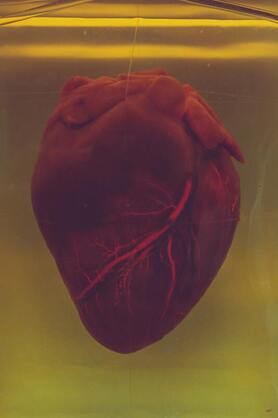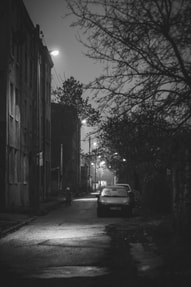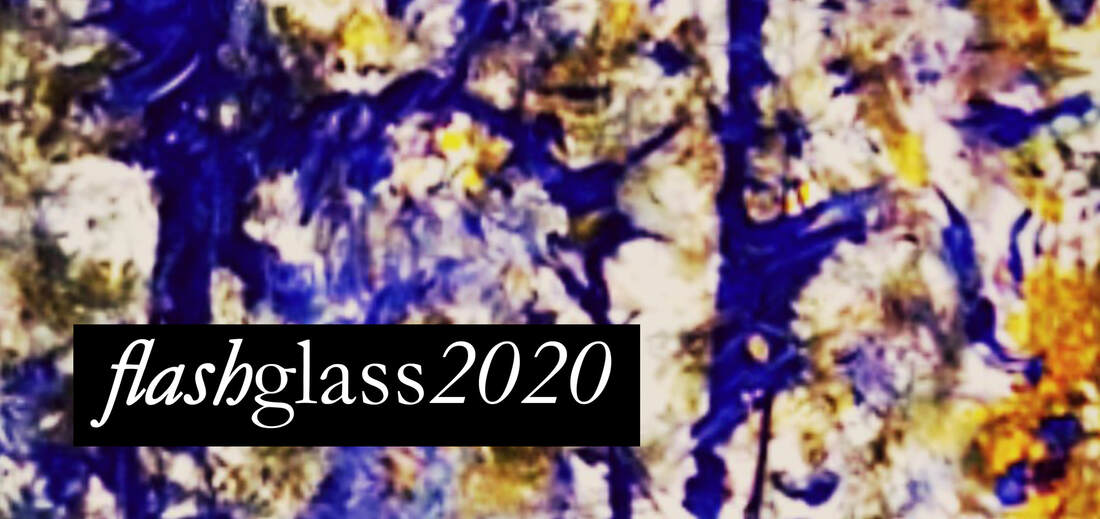|
We are pleased to present our annual flashglass anthology! Comprised of all flash works originally published online at rowanglassworks.org in 2020, this anthology is available for online viewing and for purchase in print.

By Glassworks Magazine in flashglass 32 pages, published 1/1/2021
an anthology of work originally published at rowanglassworks.org
0 Comments
 Once there was a girl whose heart stopped beating. It stopped on a Tuesday. Three in the afternoon. No one noticed, so at first she said nothing. Assumed it was fine. She had a check-up on Thursday anyway, no need to panic. The doctor told her, “Eat more vegetables. Green ones. Hearts need greens to grow.” The girl did not want her heart to grow, she wanted it to beat because her fingers were growing cold. Cold like green left in the refrigerator for too long. Her heart was refrigerator-green. Gone. Goodbye. The girl wore coats and mittens because her heart had stopped. Must keep the blood warm, the doctor said. The girl had to carry a sign that read; My heart has stopped. People saw it and let her onto the bus first. Off the bus first. Parking spots with blue lines. “Get a dog,” her mother said. Her mother liked dogs. The girl did not need a dog. She got one anyway. It licked her cold fingers once and cringed. On their first walk together, the dog ran away. It was a Sunday. “Get some exercise,” her father said. Her father liked running. The girl did not. She bought running shoes anyway. The shoes pinched the backs of her heels until they were raw and red but she did not bleed. She couldn’t anymore. The doctor stopped picking up her calls. “Talk to someone,” her sister said. There were flyers for groups. Lots of groups, one for everything. The girl did not need a group. She needed warmth. It was hard to remember how it used to feel when she had a heart. The girl went to a group. The group met in a large room. The walls were painted refrigerator-green. There were chairs. No one sat in them. There were drinks. No one drank them. Everyone had a sign. My fingers have stopped. My lungs have stopped. My eyes have stopped. Oh, the girl thought. It’s all of us. Christina Trujillo is a graduate of the Sarah Lawrence College MFA program. Her work has been published in Dark Phrases and through Dynamite Entertainment. When Christina is not writing, she works at UC Riverside as the Coordinator of the Graduate Writing Center, where she supports students with their academic and creative writing.
They couldn’t wait to get out of that garden, tedious days with no TV, no internet, only the drone of bees and a few stupid birds keeping them awake at night. Besides you can only fuck so much. They packed their sandals and fig leaves, grabbed a few apples and strolled past the gate, mumbling good riddance to the snoring God surrounded by empty bottles of ambrosia. God needs people to think he kicked them out, so he can hang onto his omnipotence and his followers will continue to sing alleluias and put cash in collection plates. But if you listen you can hear God stomping about his garden in a total snit, grumbling to the snake about the couple’s lack of gratitude and how much he misses them. They bought a condo in the city, went to concerts and French restaurants, had close calls with cancer (him) and kidney disease (her). Death riding on their shoulders, whispering in their ears. They took their grandkids to Disney World, watched them ride roller coasters, hands held high and stuff clouds of cotton candy into eager mouths. Then they tucked them in at night, enjoying every precious moment, aware of the tapping on their shoulders and the soft urgency of life. Claire Scott is an award winning poet who has received multiple Pushcart Prize nominations. Her work has appeared in the Atlanta Review, Bellevue Literary Review, New Ohio Review, Enizagam, and Healing Muse, among others. Claire is the author of Waiting to be Called and Until I Couldn’t. She is the co-author of Unfolding in Light: A Sisters’ Journey in Photography and Poetry.
Strolling through sliding glass doors. Impersonating patrons. Three blue officers in knee-length shorts. Gun-adorned belts, assorted accoutrements of order. Often summoned here. Today, their own initiative. Eyes scooping up faces. Dragneting. Bail jumpers. Warrant dodgers. Trial absentees. Any other lucky find. The computer banks a rich catch zone. The weary homeless. The criminally convicted, idle, disposed. The uniquely unsound. A verbal piscary to fill the daily quota of foul speech. A fish fry party din. Air-conditioned chatter. Airy hopes. Smartphone disputes all can judge. Personal food courts at each desk. Mouths. Fingers dipped in salty chips. Oozing butter tarts. Meaty buns. Applied to keyboards. Flavouring them for future users. While screens explode. Flash. Amuse the arcade minds. Last stop. Bathroom. Occupied by emptied beer cans. A needle that shirked the disposal bin; soiled paper towels by the trash can. Soapy counters. Officers going. Hunches unrewarded. Next time. For these wonders, children brought along. Shrieking infants. Story hour. Instill the habits early. Movies and music scanned. Carried out. In the low-volume spaces, books shelved. Untouched like yearning virgins. Keen with words rendered dumb. A library demoted. Degraded. Social crumbling catchall. Netting for the falling bodies. Someone sanctioned this. Underwrote these values. Lauro Palomba has taught ESL and done stints as a freelance journalist and speechwriter. Approximately ninety of his poems and stories have appeared in American and Canadian literary journals.
 Over the years, he’s gotten pretty good at pushing up that boulder, every time a little easier until it becomes like air going up and relief when it goes back down. It’s predictable, a stroll, no longer a challenge. (not quite the torture the gods dreamed up for him) so Sisyphus takes up golf. He breaks apart that boulder into small round rocks and he uses the hill to practice his swing. Doesn’t have to worry about fetching them, because they always come right back down anyways. And there he goes, still swinging today, nothing but form on his mind. It’s now an elegant kind of torture: frustration of caring. Who knows, maybe one or many eternities later he’ll go insane. Either way, one must imagine Sisyphus in plaid shorts and a polka dot tie and an awful top your father would wear — and yes sure, happy. Maybe even happier.  Angie Kang is an artist and writer living in Providence, Rhode Island. Her writing has been published or is forthcoming in Narrative, Lunch Ticket, Hobart, 5×5, and others. Find more of her work at www.angiekang.net.  and a chamber trio performing in a church, which is by no means unusual. In the same space there is also a man sleeping. His face is tilted upwards, angled towards the wooden rafters, a framed image of devout rapture if not for his snoring. This wouldn’t be all together unusual either, except that it’s the pianist and he is very still. Though resting on the keys, his hands have stopped moving entirely. Again, if not for the snoring, the audience would all be very concerned: for the time being, they are only mildly annoyed. They still get what they came for — both the cellist and violinist continue on as if they’ve practiced like this for weeks, and for all we know, they have. Without the piano’s undercurrent of rhythm, the strings hobble along towards the finale, their determination filling most limping gaps, reverberant snoring filling the rest. When the piece is over, the pianist’s slumped form rises to the sound of clapping, bows to accept his undeserved portion of the applause. Well, who’s to say what he can or can’t claim? Here, in his own house, God stays silent, while through the broken window, the cicadas are screaming their approval.  Angie Kang is an artist and writer living in Providence, Rhode Island. Her writing has been published or is forthcoming in Narrative, Lunch Ticket, Hobart, 5×5, and others. Find more of her work at www.angiekang.net.  When I was a kid, I felt guilty whenever my grandfather would talk to me about God and His miracles, because I didn’t believe in Him, and didn’t think that miracles were written in the dictionary of the remotely plausible. In my case, I’ve found that everything rests in the tumbling of dice or the dancing of tops. I still feel guilty when he tells me that the Lord is watching him, unseen but always present, and thanks Heaven that he has so much faith, because if he didn’t, he’d be trapped in a cage of his own design, brutalized by doubt and chilly facts. In other words, he’d be like me. I sometimes envy the miracles he holds dear because he never lets them slip through the cracks in his fists. Every day is a miracle, he declares, even the day you die, because nature is a miracle, too, and so is the soul. In response, I think of the nothingness I expect to experience when I have my final breath, and the lack of anything that could be considered a miracle. But he expects one anyway. And even if the otherworldly miracle of Heaven turns out not to exist, he can at least count the many he’s already had for himself, and that would be a miracle in itself. My grandmother’s recovery from cancer was a miracle, he says, and those tears, those agonies wrote him a tome of memories that recount more miracles than he has seen in all the years he has witnessed the days turn, the seas wax and ebb, the leaves of the Earth fall and swell and fall again. But I saw my grandmother’s recovery as effective chemotherapy for corrupted tissue and the skill of surgeons unable to tell a miracle from an unexpectedly good prognosis. But those doctors were miracles, too, he says, because they let him keep the miracle he could not live or love without. He says his age is a miracle, that he should have died long ago, yet he has lived to see me grow, and that has been the only miracle he could have ever asked for. Maybe he will live to see a miracle in a decade, he says, when my college degree hangs from an office wall, when my own children scamper through my house, when I discover and foster other miracles of my very own. Maybe with advances in medicine it will happen, I tell him. He says it would be a miracle if it did. I often wonder if he fashions these miracles with his own liver-spotted hands, or if he simply finds miracles buried beneath his feet, in piles of neglected dreams, and unearths them and repaints them and places them on his bedside shelf, where they can live forever, because miracles cannot expire like people can. When he dies, I imagine he’ll compliment the flower bouquets arranged around his resting bed and say it is a miracle that they bloomed just for him. And maybe, by then, I’ll be able to say it was a miracle that he was with me long enough to tell me all of these things, even if it was by chance that the sun rose and set a certain way, on a single day, however many years ago, and breathed us into life.  Andrew Jason Jacono is a proud Manhattan native who has been writing ever since he could hold a pen. His work has previously appeared or is forthcoming in Cleaver Magazine, Maudlin House, Riggwelter, Gone Lawn, and Thin Air Magazine, among others. If you'd like to learn more about him, you can visit his website: www.andrewjacono.com.  Remember the night we parked in the alley behind your grandmother’s house, the kitchen window, the cathode light from the black and white TV, and how we mimicked your grandmother cheering for the wrestler, Reggie “The Crusher” Lisowski, waving her tiny clenched fist uppercut. We laughed ourselves into our own desperate embrace, clasped in a bear hug of polarized electrostatic discharge. I showed you my best moves, a frantic knee lift over the stick shift progressing into a scissors hold, the gear knob delivering a low blow to my midsection. And how, after a prolonged front facial you executed a deft duck under into a modified figure-four-leg-lock, pinning me against the door. Clumsily I reached under your blouse hoping for a takedown, and just as I was about to undo the final hook of your bra and apply the patented dragon-screw-leg-whip, your Grandma Añya rapped hard on the steamed windshield, yanked open the car door and from your lap I fell, head down on the pavement between her feet answering to the accusing eye-gouging finger of Añya, the four foot ten inch wrath of God. And from there, the view up her skirt, past the drooping support hose, past the varicose veins to her white boxer shorts, and back to her prayer calloused knee that dropped down across my chicken neck. I remember her face, the high cheek bones drawn in a grimace, her squinting eyes, and her raspy voice, her words just like The Crusher’s, "How ‘bout dat!" as I cried, "Añya, for mercy’s sake, Añya."  Les Bares lives in Richmond, Virginia. His poems have appeared in The Cream City Review, Stand Magazine (U.K.), Spillway, The Midwest Review, Southword (Ireland), Slipstream, The Tishman Review and other journals. He won the 2018 Princemere Poetry Prize and was the third place winner of the 2015 Streetlight Magazine poetry contest.  Morton knows his mother will forget what he tells her. “It rained last night,” he’ll say. Then they’ll watch television for a while, the news or a British comedy. His mother will look out the window. “Did it rain last night?” she’ll ask. “Yes,” he’ll say. “Good,” she’ll say, “we need the rain.” After putting his mother to bed, Morton will change the channel on the television to something he wants to watch. A baseball game. A documentary about army medics in combat zones. He’ll marvel at what other people can do. He’ll imagine hitting a fastball into the upper deck, suturing chest wounds with shrapnel flying overhead. He’ll fall asleep on the couch. In the morning, Morton will fix his mother breakfast, two pieces of toast with apricot jam and the crust trimmed off, the way she likes it. “Thank you,” she’ll say. At lunch, she’ll say she’s hungry, that she hasn’t eaten all day. “You had toast for breakfast,” Morton will say, “like always.” “Like always?” “Like always.” “I like toast,” she’ll say. “I know you do.” “With apricot jam.” “I know you do.” They’ll play double solitaire in the afternoon. Morton’s mother will complain about the heat and Morton will lower the blinds over the west-facing windows. “That’s better,” his mother will say. Between games, she’ll ask about Morton’s job. He’d been a custodian at the hospital, changing sheets, taking used syringes and surgical gloves to the incinerator. He’d lost the job months ago. He’ll tell her again. “I don’t have a job.” “You don’t?” “I don’t.” “That’s disappointing.” The next day, when she asks about his job, he tells her he’s a doctor. “I save people from terrible diseases,” he says. “That’s wonderful,” his mother says. She smiles. “I’m so proud of you.” Maybe she’ll remember until tomorrow. Morton imagines her smiling until then, when he’ll tell her again. Scott Ragland has an MFA in Creative Writing (fiction) from UNC Greensboro. Before taking a writing hiatus, he had several stories published, most notably in Writers’ Forum, Beloit Fiction Journal, and The Quarterly. More recently, his work has appeared in Ambit, The Common (online), Fiction International, Cherry Tree, and CutBank (online), among others.
 I am thinking about tin turning to dust in the snow. I am thinking about that young French soldier, on Napoleon’s doomed march, with his chapped skin and shaking fingers. How, when going to do up his coat one morning, he found nothing there. How he would pull, and grasp, and nearly tear the fabric into a frenzied shred with his panic. How something he had never known was now known, now unknowable. How all that was standing between him and a frozen death were tiny circles of hammered metal. "Maybe God has singled me out," he thinks with his dread and resolve. But then another man rises, and another, and not a button to be found among them. And that young French soldier realizing that they are all going to die in this white terror of a country. He had a moment to be alone with his death before it came for him, and none of these other men had such a luxury and a torture. Did it make him better, later? Being alone when the universe had a hole blown through it? Or was he haunted by the waiting, waiting, waiting for another voice. “Where are they? Where have they gone? How could they possibly be gone?” I'm thinking about this, standing alone outside a hospice in January. It's snowing very softly. My mother is dead. I'm waiting for my father to come outside. Juliann Shepherd is in her last semester at Ohio University, pursuing a degree in English with a concentration in Creative-Writing. Her work can also be found in Polaris magazine and Words Dance website. Although she frequently can be found performing spoken word for her house plants, they have declined to comment on it's quality.
|
FLASH GLASS: A MONTHLY PUBLICATION OF FLASH FICTION, PROSE POETRY, & MICRO ESSAYS
Categories
All
COVER IMAGe:"Ice Crystals"
|
|
Glassworks is a publication of Rowan University's Master of Arts in Writing 260 Victoria Street • Glassboro, New Jersey 08028 [email protected] |
All Content on this Site (c) 2024 Glassworks
|





 RSS Feed
RSS Feed
